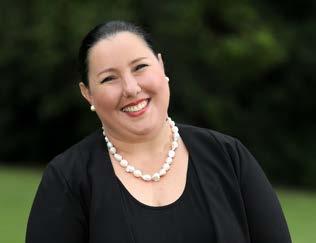
3 minute read
The King’s Institute From 2021 Onwards
Bold ideas, unjustified anticipations, and speculative thought, are our only means for interpreting nature: our only organon, our only instrument, for grasping her.
Popper, 1979
Renowned English philosopher Karl Popper suggests that making bold claims and then attempting to refute them, is necessary for the growth of knowledge which in turn leads to learning, truth, and wisdom. In the spirit of presenting bold ideas and speculative thought in anticipation that The King’s School can rigorously attempt to refute them in practice, The King’s Institute offers an alternate identity for itself into 2021. In doing so, this new identity will encourage the pursuit of knowledge and wisdom to be actualised in pursuit of the School’s strategic plans.
Whilst we undertake a bold and speculative agenda, it is based upon evidence collected, reviewed and synthesised as part of The King’s Institute review process between 21 January and 31 July 2020 that was accepted by the School Council in September of this year.
The King’s Institute plans to become The King’s Institute: Teaching and Learning Research Laboratory from January 2021. It will relinquish its sole enablement executive responsibility of Academic Excellence to become an enabler of critical review and insight across all three of The King’s Distinctives. The King’s Institute will seek to advocate and embody educational pragmatism in pursuit of evidence-based practice across the entire School community as well as state, national, and international education sectors. In doing so it would draw upon the best available evidence to inform all important decisions concerning policy and practice. That includes, but is not limited to, using evidence from high quality impact evaluations. It also includes drawing on descriptive data to diagnose and understand problems of policy or practice across all areas relevant to the School’s strategic goals.
There is also an existential threat that needs to be addressed if the institute continues to operate, and be perceived as, predominately a Senior School asset. There is much work to be done with teachers, administrators and leadership in the Preparatory and Tudor House campuses to enable them in their work and to have confidence to seek support from The King’s Institute.
Furthermore, The King’s Institute has primarily concerned its operations around the organisation and administration of professional learning opportunities for teaching staff. Our new charter sends a clear message to The King’s School community and other stakeholders that the School is invested in evidence-based solutions to contemporary teaching and learning issues beyond merely facilitating professional development experiences. It invests in teaching and supporting staff alike as it seeks to develop a more nuanced understanding of the impact the School has on society. The key performance indices or impact of The King’s Institute will be orientated to reflect its newly defined role. However, measuring impact in an academic sense of research is a contentious issue. The fundamental flawed assumption is that research is viewed as a linear process in which rigorous basic research gets converted into more relevant and impactful applied projects through translational research. Basic and applied research, and their counterparts, rigour and relevance, lie at the opposite ends of the continuum, and the transfer of knowledge is assumed to be unidirectional.
However, there is a place where rigour, relevance and impact live together in harmony: it is called the Pasteur’s Quadrant. It is commonly considered the holy grail for those who aspire for impact with rigour. It is called a quadrant, not a continuum, because it lies along two dimensions. The quadrant that scores high on both rigour and relevance is termed the Pasteur’s Quadrant (Stokes, 2011). Pasteur was the original ‘pracademic’ (practitioner + academic), one who believed in doing rigorous, impactful research. The King’s Institute sees operating in Pasteur’s Quadrant as its epistemological compass informing the nexus of research and practice.
A best-case hypothesis would suggest that meaningful change to key performance indices determined by the School would be observed within five years. A five-year impact time line would mean that The King’s Institute would have slashed the research to translational time to one-third of current estimates reported in the educational literature (National Research Council, 2002).









